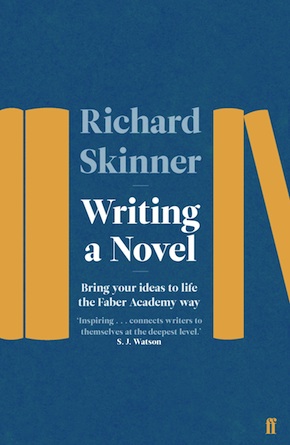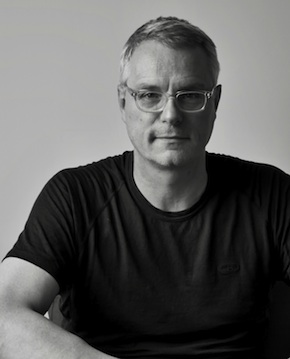Richard Skinner: Getting going
by Mark Reynolds
“If you’re burning to write a novel, this guide will fan the flames and help you discover your true talent.” Laline Paull
Richard Skinner is Director of the Fiction Programme at Faber Academy and a tutor on its six-month Writing a Novel course. Working across fiction, life writing, non-fiction and poetry, his latest book is Writing a Novel: Bring Your Ideas To Life The Faber Academy Way. I fire off some questions about the book, the course and his other recent work.
MR: Is this now the official handbook for the Faber Academy course of the same name, or just an additional tool?
RS: It’s just an additional tool. I want the six-month course to be a unique experience for the students so there is a lot of material I use on the course that I didn’t put in the book. Having said that, the book is structured to mirror the course and there is a lot of overlap.
How does it differ from and build on your previously published Fiction Writing: The Essential Guide to Writing a Novel?
It’s a revised, updated and much better book.
How does the Writing a Novel course break down in terms of theory, workshops and writing at home?
Roughly half the course comprises the taught element of the course, where we discuss, examine, test, mould and learn the tools and techniques of fiction. The other half is when students show their work to the group for critique. We call these the Peer Presentations. They start pretty much from the beginning of the course and run right through to the end. The students tend to be very nervous of the PPs to begin with, but by the end they are addicted to them. The amount of learning that goes on in the PPs is just incredible. We have guests, too – four authors and three people from the publishing industry – who come in and pass on their wisdom to the students. All the while, the students are working on their books in their own time.
How does an Introductory Session typically pan out, and what is the take home for students from that class?
The Introductory Session is mostly an administrative session when we work out the order in which students will show their work. They also do some writing exercises to interview each other about their writing and tell the class a bit about themselves.
At what point does a group dynamic tend to take hold?
There is an exercise we do in the first few weeks of the course called ‘Capture a Character’, which is when any inhibitions still present within the group tend to get dispelled straightaway. We keep the exercise secret until the day itself and it always blows their minds.
Who does this course suit better than an MA (or MFA) in Creative Writing?
Because we run the sessions in the evening and at weekends, the obvious advantage is that you don’t have to take time off from your job to do the course.
We spend a lot of time considering applications and making up the groups. We can usually tell within just a few lines whether or not someone would be right for our course and vice versa.”
What’s the typical profile of students who sign up for the online version of the course?
They are a varied bunch! They tend to be about 50% UK, 50% international, from all over the world, and they have a very wide range of profiles and motivations. One woman did the course from a catamaran in the Atlantic! What they all tend to be looking for is something quite serious, quite full-on, with a lot of personal engagement; something set against the welter of free, impersonal stuff that’s out there.
Applicants are asked to send in a writing sample of up to 1,000 words. What are the benefits – and drawbacks, if any – of keeping it short?
The selection procedure at Faber Academy is the most important part of the whole process and we spend a lot of time considering applications and making up the groups. We are very good at this now, we’ve had a lot of experience. We can usually tell within just a few lines whether or not someone would be right for our course and vice versa.
What proportion of students turn up on day one with a full draft novel, a rough outline or treatment, and all points in between? Is the course best suited to someone starting out on a new project?
Everyone is at a different stage in their lives as writers when they start at Faber Academy and everyone is at a different stage when they finish, too. It doesn’t matter what stage you, or anyone else, is at by the end – all that matters is that you leave the course brimful of confidence and knowledge of the tools and techniques of fiction to help you finish your novel.
Each class pools together 15 writers. Do you tend to mix up writers from different genres to make up a class, and why (or why not)?
Yes, exactly, we spend a lot of time putting the groups together so that there is a good mix of ages, backgrounds, styles, genres, etc. If you were a historical novelist in a class of 14 other historical novelists, it would be very boring indeed for you.
Rachel Heng is a recent alumnus who has spoken about her debut novel Suicide Club gaining fresh impetus after the end-of-course reading. What is the strike rate for students on the course finding representation and launching a successful publishing career? And which other authors have followed a similar path?
Ah, now that’s a lot of questions rolled into one. We deliberately don’t keep track of people who have found agents – we try to make sure that students do not obsess over their percentage ‘chances’ because it really does not work like that. What’s more, it can be ten years from first draft to second, or from second draft to agent, or agent to publisher. The reading is the beginning of a long journey into the publishing world. I can tell you that so far we know of 80 students who have gone on to sign a deal for their first novel. That includes big names like S.J. Watson and Laline Paull, but again we try not to lean on that too much. If you come to us and write the novel you’ve always wanted to write, and you’re thrilled with what you’ve done, that is success.
There are two daytime-only classes and four evening-based classes running simultaneously, comprising six tutors and about 90 students. How much crossover is there between the groups?
A group of 15 will stick together throughout the course; that dynamic is what it’s all about, and we want to hot-house that group feeling, and we want to support it long after the course ends. But the groups often touch at the edges – joint guest lectures, mingling in the common spaces, the reading day, maybe the pub after class? You’re all going through the same experience, so we encourage people to mix it up.
Send us something that is as representative of you as you can muster. That’s what we’re looking for.”
The next deadline is 3 September, for courses beginning in early October. How many applications do you expect to receive for the 90 places on offer? And how can candidates make their applications stand out?
We always receive more applications than there are places available, it’s always oversubscribed, always a very busy time of year! Stand-out applications are always the most honest ones. Yes it’s good to have a brilliant first sentence, maybe something that catches the eye, but ultimately the application is about giving us a sense of what you’re going to be like in class, who you are, and where you want to get to with us. So be honest. If your 1,000 words is all you’ve ever written, so be it, that’s great, let us know. Send us something that is as representative of you as you can muster. That’s what we’re looking for.
You’ve recently published poetry, twin historical novellas and a non-fiction book about the Busby Babes. What are you currently writing, and what will you publish next?
I am just putting the finishing touches to my second collection of essays, reviews and interviews. I have a couple of commissioned essays to write this summer. I’m also half way through another pamphlet of poems.
What’s next for Vanguard Readings and Vanguard Editions?
Vanguard Readings takes a break in August and September but is back in the autumn with a fantastic array of events. October’s Vanguard, for example, is the launch for Vanguard Editions’ next book, Fugue States, a collection of stories by Portuguese author Ana Teresa Pereira. This is the first time Ana’s work will be translated into English and I couldn’t be prouder to publish her.
Finally, what is the Golden Rule for aspiring novelists?
Don’t use adverbs!
 Richard Skinner is the author of three novels, three books of non-fiction and three books of poetry. His latest book of poems is The Malvern Aviator (Smokestack, April 2018). He also runs the London-based monthly Vanguard Readings, #VanguardOnTour and Vanguard Editions and has so far edited and published three anthologies as well as six original books of poetry, stories and art-writing. Writing a Novel: Bring Your Ideas To Life The Faber Academy Way is published by Faber & Faber (£9.99).
Richard Skinner is the author of three novels, three books of non-fiction and three books of poetry. His latest book of poems is The Malvern Aviator (Smokestack, April 2018). He also runs the London-based monthly Vanguard Readings, #VanguardOnTour and Vanguard Editions and has so far edited and published three anthologies as well as six original books of poetry, stories and art-writing. Writing a Novel: Bring Your Ideas To Life The Faber Academy Way is published by Faber & Faber (£9.99).
Read more
richardskinner.weebly.com
faberacademy.co.uk
@RichardNSkinner
Author portrait © Christian Patracchini

